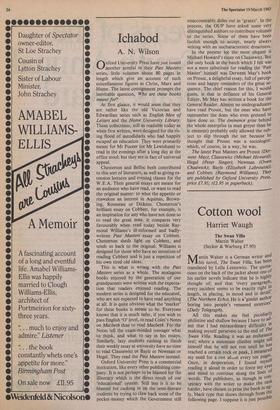Ichabod
A. N. Wilson
Oxford University Press have just issued another armful in their Past Masters series, little volumes about 80 pages in length which give an account of such miscellaneous figures as Christ, Marx and Hume. The latest consignment prompts the inevitable question, Who are these books meant for?
At first glance, it would seem that they are rather like the old Victorian and Edwardian series such as English Men of Letters and the Home University Library. Those collections, still as readable today as when first written, were designed for the ris- ing flood of autodidacts who had happily escaped an education. They were primarily meant for Mr Pooter (or Mr Lewisham) to read in the evenings after a long day at the office stool; but they are in fact of universal appeal.
Chesterton and Belloc both contributed to this sort of literature, as well as giving ex- tension lectures and evening classes for the W.E.A. Their general essays are meant for an audience who have read, or want to read the original matter: to whet the appetite or reawaken an interest in Aquinas, Brown- ing, Rousseau or Dickens. Chesterton's brilliant essay on Cobbett, for example, is an inspiration for any who have not done so to read the great man. It compares very favourably when read today beside Ray- mond Williams's ill-informed and badly- written Past Masters essay on Cobbett. Chesterton sheds light on Cobbett, and sends us back to the original. Williams is designed for those who have no intention of reading Cobbett and is just a repetition of his own tired old ideas.
This is what is wrong with the Past Masters series as a whole. The analagous books enjoyed by the generation of our grandparents were written with the expecta- tion that readers enjoyed reading. The modern series is designed for the educated, who are not expected to have read anything at all. It is quite obvious what the 'market' for these books is meant to be. Everyone knows that it is much safer, if you wish to pass English '0' level, to read Coles's Notes on Macbeth than to read Macbeth. For the Notes tell the exam-minded teenager what to think, and what to say in his essays. Similarly, lazy students rushing to finish their weekly essay at university have no time to read Clausewitz or Bayle or Newman or Hegel. They read the Past Masters instead.
Oxford University Press is a commercial institution, like every other publishing com- pany. It is not perhaps to be blamed for the illiteracy which is the direct result of our 'educational' system. Still less is it to be blamed for cashing in on the semi-literate students by trying to claw back some of the pocket-money which the Government still unaccountably doles out as 'grants'. In the process, the OUP have asked some very distinguished authors to contribute volumes to the series. Some of them have been foolish enough to accept, nearly always writing with an uncharacteristic dreariness.
In the present lot the most elegant is Michael Howard's essay on Clausewitz. But the only book in the batch which I felt was not a mere substitute for reading the 'Past Master' himself was Derwent May's book on Proust, a delightful essay, full of percep- tions and happy reminders of the great se- quence. The chief reason for this, I would guess, is that in defiance of his General Editor, Mr May has written a book for the General Reader. Almost no undergraduates have read Proust, but the ones who have outnumber the dons who even pretend to have done so. The eminence grise behind the whole enterprtse (a man greyer than he is eminent) probably only allowed the sub- ject to slip through the net because he thought that Proust was a sociologist: which, of course, in a way, he was.
The latest Past Masters are Proust (Der- went May); Clausewitz (Michael Howard); Hegel (Peter Singer); Newman (Owen Chadwick); Bayle (Elizabeth Labrousse); and Cobbett (Raymond Williams). They are published by Oxford University Press, price £7.95; (f2.95 in paperback).










































 Previous page
Previous page